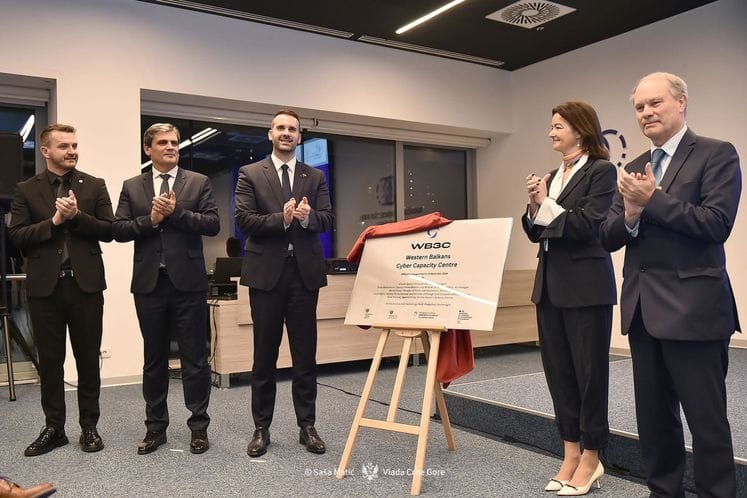- Government of Montenegro
Western Balkans Cyber Capacity Centre inaugurated:...
Western Balkans Cyber Capacity Centre inaugurated: A day to remember

The first Western Balkans Cyber Capacity Centre (WB3C) was inaugurated yesterday at the premises of the Science and Technology Park. This marks a pivotal moment, establishing Montenegro as a central hub for advancing knowledge in cybersecurity, fostering collaboration, and exchanging expertise.
The Letter of Intent for the establishment of WB3C was signed in November 2022 by representatives from Montenegro, France, and Slovenia.
It took over two years of intensive work, supported by the Government of Montenegro, international partners, the academic community, and relevant institutions, to achieve the formal, programmatic, and technical prerequisites necessary for the centre’s launch.
The Western Balkans Cyber Capacity Centre, recognized as part of the Berlin Process, holds a key role. With expertise from France and Slovenia, training programmes in cybersecurity will target all Western Balkan countries. I believe this initiative will significantly enhance the region’s cyber capacities. Montenegro has already intensified its efforts, and WB3C will complement our national endeavors perfectly, said Prime Minister Milojko Spajić during his remarks.
Minister of Public Administration Marash Dukaj highlighted the strategic approach of the Montenegrin Government in building a robust cybersecurity ecosystem. This event reflects careful planning and commitment, not just for Montenegro but for the region, because cybersecurity cannot be confined by borders.
Deputy Prime Minister and Minister of Foreign Affairs Ervin Ibrahimović emphasized Montenegro’s dedication to strengthening cyber resilience as a NATO member and a leading EU candidate country. Through our contributions to cyber diplomacy within the UN, OSCE, and other organizations, we are establishing standards for responsible behaviour in cyberspace while ensuring the protection of human rights and freedoms. Through Chapter 31 and the EU’s common foreign and security policy, we are reinforcing our capacity to address hybrid threats effectively, he said.
The centre's inaugural activity was a training session on cyber hygiene held in May 2023. Since then, WB3C has organized numerous training programmes across three key areas: cybersecurity, cybercrime, and cyber diplomacy. These sessions have welcomed participants from all Western Balkan countries.
Today, we position Montenegro as a regional leader in cybersecurity education, addressing a critical need for knowledge enhancement. Investment in education is always the most impactful and rewarding. Milestones such as the Information Security Law aligned with the NIS2 Directive, the Government Information Security Operations Centre, and today’s inauguration of WB3C are foundational achievements upon which we will build further progress, Dukaj stated.
Slovenia’s Deputy Prime Minister and Minister of Foreign Affairs Tanja Fajon underlined the importance of a united regional response to growing cyber threats. In an era where cyberattacks are becoming increasingly sophisticated, equipping this region with the tools to combat these challenges is imperative. This centre is just the beginning; it will play a critical role in protecting our digital environment and fostering a culture of cybersecurity for future generations, Fajon said.
France's Special Envoy for the Western Balkans René Troccaz encouraged all Western Balkan countries to fully leverage the benefits of this initiative.
Aligned with its Reform Agenda, Montenegro continues to prioritize advancements in human resources, infrastructure, and procedures to position itself as a secure and resilient country against cyber threats.
After the formal inauguration, delegations were hosted by President Jakov Milatović, Prime Minister Milojko Spajić, and Minister of European Affairs Majda Gorčević.

